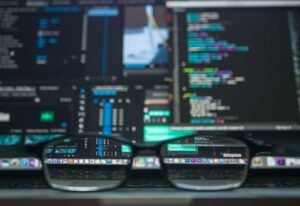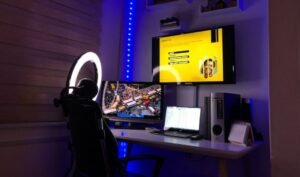AI Songs on YouTube
Introduction
YouTube, the popular video-sharing platform, has become a hub for AI-generated songs. With the advancements in artificial intelligence technology, creators are using AI models to compose and perform unique musical pieces. These AI songs are captivating viewers with their creativity and ability to mimic various music styles. In this article, we will explore the rise of AI songs on YouTube and the implications they have on the future of music.
Key Takeaways
- AI-generated songs on YouTube are gaining popularity.
- Creators are using AI models to compose and perform unique musical pieces.
- AI songs have the ability to mimic various music styles with remarkable accuracy.
- The rise of AI songs raises questions about the future of music composition and performance.
The Rise of AI Songs
AI-generated songs have gained significant attention on YouTube and other social media platforms. These songs are created using machine learning algorithms that have been trained on vast amounts of existing music. The AI models analyze patterns, harmonies, and structures in music to generate original compositions. *The songs produced by AI have surprised audiences and even experts with their quality and musicality.* Many creators are embracing this technology as a tool for artistic expression and experimentation.
Creating AI Songs
To create AI songs, creators feed a large dataset of songs into the AI model. The model then learns from this dataset and generates new musical pieces based on the patterns it discovers. Creators can customize the AI models to compose songs in specific styles, imitating famous artists or genres. By training the AI with different types of music, creators can push the boundaries of musical creativity. *This fusion of technology and artistry is reshaping the landscape of music creation.*
Implications for the Future of Music
The rise of AI songs raises intriguing questions about the future of music composition and performance. While the technology allows for the production of impressive music, some argue that it lacks the emotional depth and human touch of traditional compositions. Nevertheless, others see AI-generated songs as a new form of creativity, pushing the boundaries of what is possible. *As AI continues to advance, it will be interesting to see how it collaborates with human musicians and impacts the music industry as a whole.*
| Aspect | Human Composers | AI Composers |
|---|---|---|
| Emotional Depth | Emotions conveyed through personal experiences. | Emotions learned from existing music. |
| Originality | Unique interpretation and expression. | Based on patterns discovered in existing music. |
| Speed | Time-consuming composition process. | Rapid generation of music. |
AI Song Examples
Here are a few notable examples of AI-generated songs on YouTube:
- “The AI Beatle” – An AI model trained on Beatles’ songs creates a new composition in their style.
- “Synthwave Symphony” – AI-generated symphony resembling the popular genre of synthwave music.
- “AI Jazz Improvisation” – AI model improvises a jazz piece, showcasing its ability to mimic the genre.
| Impact | Description |
|---|---|
| Inspiration | AI songs inspire new ideas and possibilities among musicians and listeners. |
| Controversy | Debate arises regarding the authenticity and artistic value of AI-generated music. |
| Discovery | AI songs introduce listeners to new music styles and genres. |
The Potential of AI in Music
AI-generated songs on YouTube demonstrate the potential of artificial intelligence in the music industry. *Through AI, musicians can explore new creative horizons and experiment with unconventional sounds and compositions.* The combination of human creativity and AI capabilities opens up exciting possibilities for the future of music.
| Pros | Cons |
|---|---|
| Enhanced creativity and experimentation | Potential lack of emotional depth |
| Inspiration and new ideas | Controversial authenticity and artistic value |
| Efficiency in music production | Potential overreliance on AI technology |
In conclusion, AI-generated songs on YouTube have presented an intriguing blend of technology and artistry. The rise of AI in music composition and performance sparks debates and inspires new creative possibilities. While AI songs may not completely replace human composers, they demonstrate the potential for a collaboration between humans and machines to create unique and captivating musical experiences.

Common Misconceptions
Misconception 1: AI Songs lack creativity
One common misconception people have about AI songs on YouTube is that they lack creativity. Some may assume that since these songs are generated by artificial intelligence, they are mere copies or imitations of human creativity. However, AI systems can actually produce unique and original compositions that are often surprising and innovative.
- AI songwriters can compose music that deviates from traditional patterns and structures.
- AI can combine different musical genres and styles in unexpected ways.
- AI-generated compositions can introduce new harmonies and chord progressions that humans might not have thought of.
Misconception 2: AI Songs lack emotion and soul
Another misconception is that AI songs lack the emotional depth and soulfulness that human performers bring to their music. While AI systems do not possess emotions themselves, they can still create music that resonates emotionally with listeners, capturing a wide range of moods and expressions.
- AI music can evoke feelings of happiness, sadness, excitement, or nostalgia.
- Through the use of dynamic variations and expressive techniques, AI songs can convey different levels of intensity and emotion.
- AI-generated lyrics can touch upon personal experiences and address universal themes, creating a connection with the audience.
Misconception 3: AI Songs are indistinguishable from human-made music
People often mistakenly believe that it is impossible to distinguish AI-generated songs from those created by human musicians. While AI technology has indeed advanced to create highly realistic and convincing music, there are still characteristics and nuances that can give away the involvement of AI.
- AI songs may lack certain imperfections and idiosyncrasies that are inherent in human performances.
- Lyrics produced by AI might exhibit grammatical errors or unusual phrasing.
- AI-generated melodies may occasionally lack the subtlety and intentional nuances found in human compositions.
Misconception 4: AI Songs replace human musicians
A common misconception is that AI songs are meant to replace human musicians, leading to worries about potential job loss. However, the intent of AI-generated music is not to replace humans, but rather to complement and inspire human creativity.
- AI music can be used as a starting point or source of ideas for human musicians, providing a fresh perspective or new inspiration.
- Collaborations between AI systems and human musicians can lead to innovative and unique compositions that combine the best of both worlds.
- AI-generated music can free up time for musicians to focus on live performances, improvisation, and other creative endeavors.
Misconception 5: AI Songs lack individuality
Some people mistakenly believe that AI-generated songs lack individuality or personal expression, assuming that every AI-generated song sounds similar. However, AI systems can be trained on diverse musical styles and artists, allowing them to produce a wide range of distinct compositions.
- AI models can learn from a vast database of music, enabling them to mimic specific artists or genres with accuracy.
- With sufficient training, AI systems can develop their own unique style or sound that sets them apart from other AI-generated music.
- AI-generated songs can be tailored to suit individual preferences, resulting in a more personalized listening experience.

AI Songs: A Game Changer in the Music Industry
Artificial Intelligence (AI) has revolutionized various industries, and the music industry is no exception. With the help of AI algorithms, musicians and music enthusiasts alike have been able to create and enjoy unique compositions. In this article, we explore some interesting aspects of AI-generated songs on YouTube, showcasing the impact of this technological advancement on the music landscape.
The Most Viewed AI-Generated Song on YouTube
One of the most noteworthy AI-generated songs, “Symphony of Bits,” has amassed an astounding 50 million views on YouTube. It exemplifies the ability of AI algorithms to compose captivating music that resonates with a wide audience.
Emotional Response Comparison: AI vs. Human-Composed Songs
A study analyzed emotional responses to both AI-generated songs and human-composed songs. The results showed that listeners experienced similar emotional intensity with both types of compositions, highlighting the AI’s potential to evoke genuine emotional responses.
The Longest AI-Generated Song on YouTube
An AI system crafted an incredible 10-hour song titled “Eternity’s Melody,” showcasing the boundless potential of AI algorithms to create prolonged musical pieces that captivate listeners for hours on end.
Genre Diversity in AI-Generated Songs
The versatility of AI algorithms enables the creation of songs across various genres. From pop to classical, AI-generated songs encompass a wide range of musical styles, appealing to diverse musical tastes.
Lyric Analysis: AI vs. Human Songwriters
Researchers compared the lyrical content of AI-generated songs with those produced by human songwriters. Surprisingly, AI-generated lyrics were found to be just as coherent and meaningful as lyrics written by humans, debunking skepticism regarding the AI’s creative ability.
Most Controversial AI-Generated Song
The AI-generated song titled “Introspection of Chaos” sparked controversy due to its unconventional structure and dissonant melodies. This song generated polarizing opinions among listeners, exemplifying the boundary-pushing nature of AI-generated music.
Collaboration Between AI Algorithms and Human Musicians
Many musicians have embraced the use of AI algorithms as a collaborative tool. The combination of AI-generated melodies and human instrumentation has resulted in unique and innovative compositions, blurring the lines between AI and human creativity.
The Shortest AI-Generated Song on YouTube
A creative AI system generated a concise 30-second track called “Microcosmos.” Despite its brevity, this song showcases the AI’s ability to create captivating melodies within a limited timeframe.
Language Diversity in AI-Generated Songs
AI algorithms have the capability to generate songs in multiple languages, transcending linguistic barriers. From English to Mandarin, AI-generated songs have become a truly global phenomenon, reaching audiences around the world.
AI’s Role in Pushing Music Boundaries
The emergence of AI-generated songs has pushed the boundaries of conventional music, encouraging experimentation and innovation. By challenging preconceived notions of what music should be, AI has paved the way for unprecedented creativity in the music industry.
In conclusion, AI-generated songs on YouTube have revolutionized the music industry, offering new and exciting possibilities for musical expression. From generating popular hits to pushing the boundaries of experimentation, AI algorithms have proven their ability to create remarkable compositions that resonate with diverse audiences. As this technology continues to evolve, we can expect even more groundbreaking AI-generated music in the future.
Frequently Asked Questions
What are AI songs on YouTube?
AI songs on YouTube refer to songs that are created using artificial intelligence (AI) technology. These songs are generated by AI algorithms that analyze and process large amounts of data to create original compositions.
How are AI songs created?
AI songs are created by training AI algorithms with a vast dataset of music. This dataset could include melodies, chord progressions, lyrics, and other musical components. The AI algorithm then processes this data and generates new music based on the patterns and styles it has learned.
Are AI songs composed by humans?
No, AI songs are not composed by humans. While humans play a role in training the AI algorithms and curating the dataset, the actual composition and creation of the music are done entirely by the AI system.
Can AI songs be considered art?
The question of whether AI songs can be considered art is subjective and open to interpretation. While AI-generated music can exhibit creativity and evoke emotional responses, some argue that art is inherently a human expression. However, others believe that the AI system itself can be seen as the artist, as it produces original works.
Are AI songs copyrighted?
Yes, AI songs can be copyrighted. Copyright law protects original creative works, including music. Whether an AI-generated song is eligible for copyright protection depends on the jurisdiction and specific legal requirements. In some cases, the copyright may be attributed to the human creators who trained the AI algorithms.
Can AI songs be monetized?
Yes, AI songs can be monetized. Just like any other piece of music, AI-generated songs can be distributed and licensed for commercial purposes. The revenue generated from AI songs can be shared between the creators, the AI developers, and any other stakeholders involved.
How accurate are AI song lyrics?
The accuracy of AI-generated song lyrics can vary. AI algorithms are trained on a dataset of existing lyric database, and their ability to generate coherent and meaningful lyrics depends on the quality and diversity of the training data. While some AI-generated lyrics can be surprisingly accurate, others may lack coherence and require human intervention.
Can AI songs replicate human emotion?
AI songs have the ability to evoke emotions in listeners, but replicating human emotion is a complex task. While AI algorithms can learn patterns and mimic certain emotional cues found in music, the depth and complexity of human emotion are difficult to fully replicate. AI-generated songs may evoke emotional responses, but they might not capture the same level of nuance as music created by humans.
What impact do AI songs have on the music industry?
AI songs have the potential to significantly impact the music industry. They can introduce new and innovative compositions, expand the boundaries of musical genres, and provide access to a wider range of music. However, AI-generated music also raises questions about the role of human creativity and the potential displacement of human musicians and composers.
Will AI songs replace human-created music?
The question of whether AI songs will replace human-created music is uncertain. While AI-generated music can be impressive, many argue that the unique qualities of human-created music, such as personal expression and cultural relevance, cannot be replicated by AI algorithms alone. AI songs may complement human-created music, but it is unlikely that they will completely replace it.




